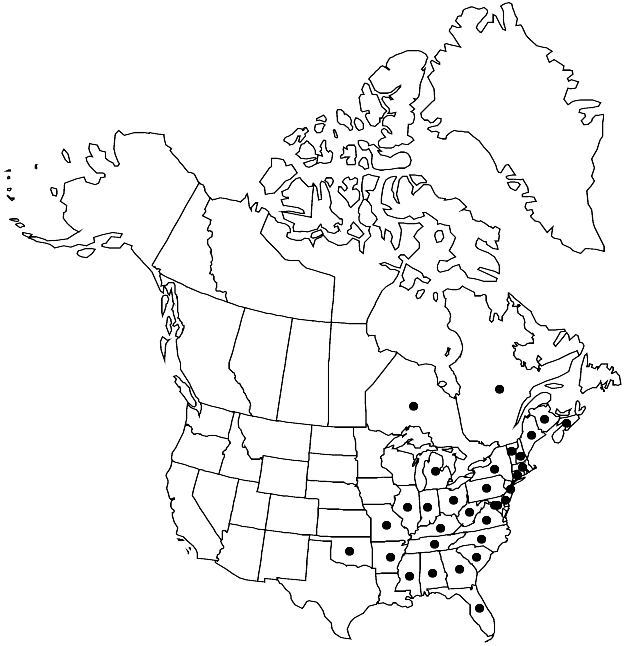Orthotrichum ohioense
in C. F. Austin, Musci Appalach., 169. 1870.
Plants 0.4–1.4 cm. Stem-leaves stiff, loosely erect-appressed when dry, narrowly lanceolate to oblong-lanceolate, 1.4–2.9 mm; margins strongly revolute to just before apex, entire; apex obtuse to bluntly acute, not incurved when dry; basal laminal cells subquadrate to short-rectangular, walls thin, not nodose; distal cells 8–10 µm, 1-stratose, lumina irregular due to uneven wall thickenings, papillae 1–2 per cell, conic, low. Specialized asexual reproduction absent. Sexual condition gonioautoicous. Vaginula with hairs absent. Seta to 1 mm. Capsule emergent, oblong to ovate, 1–1.5 mm, 8-ribbed almost to base, ribs thin, delicate, not constricted below mouth; stomata immersed, mid capsule, 1/2 to completely covered by subsidiary-cells, cells projecting vertically over stomata, inner walls thickened; peristome double; prostome absent; exostome teeth 8, splitting to 16 with age, reflexed, finely and densely papillose; endostome often absent, or segments 8, well developed, of 1 row of cells, smooth. Calyptra oblong, smooth, naked or slightly hairy, hairs smooth. Spores 15–19 µm.
Habitat: Deciduous trees in mesic hardwood forests, along streams
Elevation: low to moderate elevations (100-1000 m)
Distribution

N.B., N.S., Ont., Que., Ala., Ark., Conn., Del., D.C., Fla., Ga., Ill., Ind., Ky., Maine, Md., Mass., Mich., Miss., Mo., N.H., N.J., N.Y., N.C., Ohio, Okla., Pa., S.C., Tenn., Vt., Va., W.Va.
Discussion
Orthotrichum ohioense is distinguished by the 16 exostome teeth, eight rudimentary endostome segments, slightly 8-ribbed ovate capsules, leaves that are lanceolate and bluntly acute at the apices, and laminal cells smaller than 10 µm.
Selected References
None.